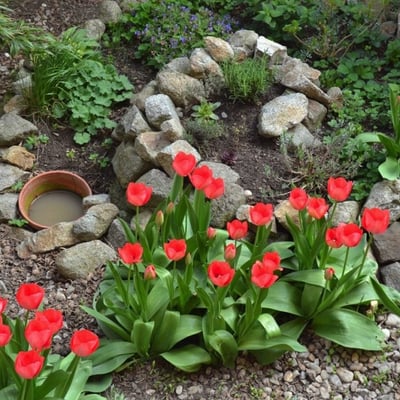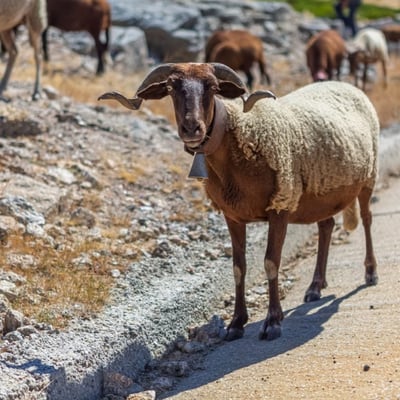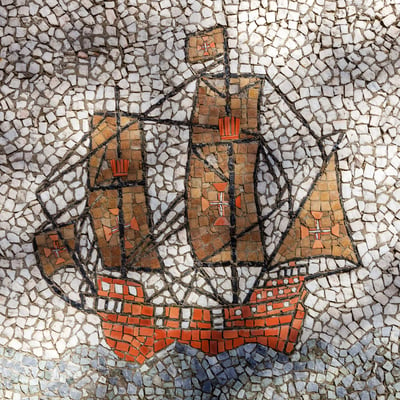1
00:00:03,493 –> 00:00:09,656
Ao longo dos milénios, a Península Ibérica foi povoada e governada por vários povos,
{{Over the millennia, the Iberian Peninsula was populated and governed by several nations,}}
2
00:00:09,989 –> 00:00:15,357
que se cruzaram entre si, misturando culturas, costumes e conhecimentos.
{{who crossed, mixing cultures, customs and knowledge.}}
3
00:00:16,399 –> 00:00:22,605
Um desses povos, os mouros,foram os que deixaram o maior legado na cultura portuguesa.
{{One of these peoples: the Moors – were those who left the greatest legacy in Portuguese culture.}}
4
00:00:23,893 –> 00:00:32,617
Tudo começou no ano 711, com a Invasão Islâmica da Península Ibérica que pôs fim ao Reino Visigodo
{{It all began in the year 711, with the Islamic Invasion of the Iberian Peninsula that put an end to the Visigothic Kingdom.}}
5
00:00:33,456 –> 00:00:39,055
Conquistando quase toda a península, os mouros deram-lhe o nome de “al-Andalus”.
{{Conquering almost the whole peninsula, the Moors gave it the name “al-Andalus”.}}
6
00:00:40,242 –> 00:00:45,045
Ao fim de 800 anos, a sua presença no território ibérico terminou,
{{After 800 years, its presence in the Iberian territory ended,}}
7
00:00:45,566 –> 00:00:50,948
como resultado da “Reconquista”, nome dado à expansão dos reinos cristãos.
{{as a result of the “Reconquista”, name given to the expansion of the Christian kingdoms.}}
8
00:00:53,002 –> 00:00:59,093
Os vestígios materiais da longa permanência muçulmana no nosso território são poucos,
{{The material vestiges of the long Muslim stay in our territory are few,}}
9
00:00:59,440 –> 00:01:04,359
devido às consecutivas políticas adoptadas pelos diferentes reis.
{{due to the successive policies adopted by the different kings.}}
10
00:01:05,445 –> 00:01:08,439
Restam principalmente as muralhas e castelos,
{{There remain mainly the walls and castles,}}
11
00:01:08,888 –> 00:01:14,299
bem como o traçado de ruelas e becos de algumas cidades do sul do país.
{{as well as the route of backstreets and alleys of some cities of the south of the country.}}
12
00:01:14,906 –> 00:01:20,766
O Castelo de Silves e o Palácio Nacional de Sintra são algumas dessas heranças.
{{The Castle of Silves and the National Palace of Sintra are some of these inheritances.}}
13
00:01:22,213 –> 00:01:28,333
Ainda assim, da poesia à pastelaria, dos tapetes à música com guitarra,
{{Still, from poetry to pastry, from carpets to music with guitar,}}
14
00:01:28,781 –> 00:01:34,843
dos minaretes às ciências que permitiram os navios portugueses ‘descobrir’ novos mundos,
{{from minarets to sciences that allowed Portuguese ships to ‘discover’ new worlds,}}
15
00:01:35,118 –> 00:01:37,216
o legado árabe é imenso.
{{the Arab legacy is immense.}}
16
00:01:37,852 –> 00:01:43,987
Quanto à agricultura, os árabes introduziram amêndoas, alperces, alfarrobas,
{{Regarding agriculture, the Arabs introduced almonds, apricots, carob,}}
17
00:01:44,175 –> 00:01:50,483
figos, limões, azeitonas, laranjas, romãs, arroz, palmeiras,
{{figs, lemons, olives, oranges, pomegranates, rice, palm trees,}}
18
00:01:50,584 –> 00:01:54,577
açúcar e várias especiarias, sobretudo no Algarve.
{{sugar and several spices, especially in the Algarve.}}
19
00:01:55,778 –> 00:02:03,099
Bastantes receitas tradicionais do Alentejo têm fortes e diretas influências da cozinha árabe,
{{Quite a few traditional Alentejo recipes have strong and direct influences from Arabic cuisine,}}
20
00:02:03,461 –> 00:02:05,848
excepto as ligadas ao consumo do porco.
{{except for the ones related with the consumption of pork.}}
21
00:02:06,470 –> 00:02:13,530
Açorda, bolinhos de amêndoa, o ensopado de borrego, a cabeça de borrego assada no forno,
{{Açorda, almond cookies, lamb stew, lamb head baked in the oven,}}
22
00:02:13,776 –> 00:02:18,811
as famosas migas à alentejana, e os carapaus de escabeche,
{{the famous migas à alentejana, and pickled mackerel,}}
23
00:02:19,086 –> 00:02:22,442
são alguns dos pratos típicos deixados por estes povos.
{{are some of the typical dishes left by these people.}}
24
00:02:24,019 –> 00:02:29,734
As suas técnicas arquitetónicas estão presentes, sobretudo, no sul do país.
{{Their architectural techniques are mainly present in the south of the country.}}
25
00:02:30,400 –> 00:02:33,438
Estas incluem os famosos azulejos (al-zulayj),
{{These include the famous “azulejos” [tiles] (al-zulayj),}}
26
00:02:33,727 –> 00:02:38,950
usados na decoração de interiores e de fachadas de muitos edifícios como –
{{used in the decoration of interiors and façades of many buildings such as –}}
27
00:02:39,558 –> 00:02:44,520
casas, igrejas, mansões, estações de comboios, entre outros.
{{houses, churches, mansions, train stations, among others.}}
28
00:02:45,779 –> 00:02:51,783
O arco em ferradura, as casas brancas de paredes grossas, estruturas cúbicas e cúpulas
{{The horseshoe arch, the white houses with thick walls, cubic structures and domes}}
29
00:02:52,029 –> 00:02:55,212
foram outras influências trazidas pelos mouros.
{{were other influences brought by the Moors.}}
30
00:02:56,312 –> 00:03:01,563
Na língua, a presença Árabe influenciou, sobretudo, o léxico.
{{In the language, the Arabic presence mainly influenced the lexicon.}}
31
00:03:02,547 –> 00:03:08,450
Por exemplo, a palavra “Olá” deriva diretamente da expressão “wa-Allah”
{{For example, the word “Hello” derives directly from the expression “wa-Allah”}}
32
00:03:08,985 –> 00:03:11,590
que significa “Deus”/”Saudação”.
{{which means “God” / “Salutation”.}}
33
00:03:12,559 –> 00:03:17,941
“Oxalá” é outra expressão muito utilizada, que vem da expressão “insha’Allah”,
{{“Oxalá” is another widely used expression, which comes from the expression “insha’Allah”,}}
34
00:03:18,462 –> 00:03:20,545
“Se Deus quiser” em português.
{{“God willing” in Portuguese.}}
35
00:03:21,963 –> 00:03:27,620
Quase todas as palavras começadas por “Al” têm origem árabe – mas não são as únicas.
{{Almost all the words starting with “Al” are of Arabic origin – but they are not the only ones.}}
36
00:03:28,792 –> 00:03:34,840
Vamos enumerar algumas, começando pelos produtos gastronómicos – açúcar (al-sukkar);
{{Let’s list some, starting with the gastronomic products – sugar (al-sukkar);}}
37
00:03:35,129 –> 00:03:39,759
alface (al-khass); alfarroba (al-kharrūbah); arroz (al-ruzz); azeitona (al-zaytunah);
{{lettuce (al-khass); carob (al-kharrūbah); rice (al-ruzz); olive (al-zaytunah);}}
38
00:03:40,033 –> 00:03:45,285
azeite (az-zayt); cenoura (sannarīyah); espinafre (isbanākh); laranja (naranj); limão (laymūn)
{{olive oil (az-zayt); carrot (sannarīyah); spinach (isbanākh); orange (naranj); lemon (laymūn)}}
39
00:03:45,633 –> 00:03:51,116
romã (rummān); açafrão (al-za’cfarān); alecrim (al-iklīl); estragão (al-ṭarkhūn); entre outros.
{{pomegranate (rummān); saffron (al-za’cfarān); rosemary (al-iklīl); tarragon (al-ṭarkhūn); among others.}}
40
00:03:52,013 –> 00:03:57,351
Há os objectos encontrados nas nossas casas como a garrafa (gharāfah); o sofá (ṣuffah);
{{There are the objects found in our houses like the bottle (gharāfah); the sofa (ṣuffah);}}
41
00:03:57,641 –> 00:04:01,446
alcatifa (al-katifa), almofada (al-mokhada) e alfinete (al-filed).
{{carpet (al-katifa), cushion (al-mokhada) and pin (al-filed).}}
42
00:04:02,719 –> 00:04:07,334
Também se encontram na matemática e ciências com as seguintes palavras –
{{They are also found in mathematics and science with the following words –}}
43
00:04:07,595 –> 00:04:14,366
álgebra (al-jabr), cifra (ṣifr) e algarismo (este com origem no nome do matemático Al-Khwarizmi).
{{algebra (al-jabr), cipher (ṣifr) and algorism (this one deriving from the name of the mathematician Al-Khwarizmi).}}
44
00:04:15,350 –> 00:04:20,486
Nos animais, com as palavras camelo (jamal), girafa (zarāfah) e javali (djabali)
{{In animals, with the words camel (jamal), giraffe (zarāfah) and boar (djabali)}}
45
00:04:20,920 –> 00:04:24,291
e no comércio com cheque (sakk) e tarifa (tacrifah).
{{and in commerce with check (sakk) and tariff (tacrifah).}}
46
00:04:25,246 –> 00:04:32,393
Outras formas comuns de início de termos com origem Árabe são as palavras que começam por x-,
{{Other common beginnings of terms with Arabic origin are words beginning with x-,}}
47
00:04:32,682 –> 00:04:43,461
como xadrez, xarope e xerife, ou por enx-, como enxaqueca, enxoval, enxofre e enxada.
{{such as chess, syrup, and sheriff, or with “enx-“, such as migraine, litter, sulfur, and hoe.}}
48
00:04:44,488 –> 00:04:50,579
Alguns nomes próprios e apelidos têm também a sua origem em nomes Árabes,
{{Some first names and surnames also have their origin in Arabic names,}}
49
00:04:50,796 –> 00:04:52,807
como por exemplo “Leonor” (em Árabe “Li an-Nur” ou “que vem da luz”),
{{such as “Leonor” (in Arabic “Li an-Nur” or “coming from light”),}}
50
00:04:54,051 –> 00:04:56,699
“Abel” (“Abu l-” ou “pai de”), “Fátima” (nome de uma das filhas do profeta Maomé),
{{“Abel” (“Abu l-” or “Father of”), “Fatima” (name of one of the daughters of the prophet Muhammad),}}
51
00:04:57,755 –> 00:05:00,562
“Albuquerque” (“Abu-l-qurq” ou “o do sobreiro”), Bordalo (“Badala” ou “abundante”)
{{“Albuquerque” (“Abu-l-qurq” or “cork oak”), Bordalo (“Badala” or “abundant”)}}
52
00:05:01,068 –> 00:05:02,124
e “Almeida” (“Al maida”, ou “a mesa”).
{{and “Almeida” (“Al maida”, or “the table”).}}
53
00:05:03,195 –> 00:05:09,141
Por último, muitos termos do calão português, do mais brejeiro ao mais indecente,
{{Finally, many terms of the Portuguese slang, from the most vulgar to the most indecent,}}
54
00:05:09,662 –> 00:05:13,813
têm origem no Árabe. Por exemplo, “marafada” (com origem em “Mraa Khaina” ou “mulher que engana”),
{{originate in the Arabic. For example, “deceptive” (from “Mafa Khaina” or “woman who deceives”),}}
55
00:05:14,306 –> 00:05:17,735
“mânfio” (de “manfi”, ou “desterrado”) ou ainda “marado” (de “marid”, ou “doente”).
{{“devious” (from “manfi” or “exiled”), or even “crazy” (from “marid” ou “sick”).}}
 We respect your privacy and have a ZERO TOLERANCE for spam.
We respect your privacy and have a ZERO TOLERANCE for spam.
















Obrigada. Very interesting !!!
Yes it is very interesting, thank you!
Olá o equipe de (da/do?) Practice Portuguese. Adoro todos esses episódios históricos e culturais, como muitos do nível C1. Continuem com o ótimo trabalho! E muito obrigada!
It makes sense when a language adopts words from another to give names to new things – things that have been introduced by a foreign culture. So for example ‘alfândega’ makes sense to me because the Moors must have introduced the new concept of customs tariffs, but I’ve never understood why ‘alcançar’ would have been adopted, assuming it really is a word derived from Arabic. Did people have no native word for ‘to reach’ before the Moors? Reaching can’t have been a new concept introduced by the invaders. I suppose the necessity for local people to communicate with the occupiers meant that certain new words came into common use simply for convenience, even though there was already a word in the native language, and then the new word just stuck. Is there still a non Arabic-derived Portuguese word for ‘to reach’? I also wonder about ‘azeitona’; didn’t the Romans bring olive cultivation to Iberia, in which case why didn’t Portugal stick with the Roman word, as it has done with ‘oliveira’ for the olive tree? It’s all very fascinating.
Olá! ‘Alcançar’ is an exception, since it derives from Latin (incalciare). As for ‘azeitona’, I wonder the same 🙂 Dictionaries will show you the word ‘oliva’, but it has fallen pretty much completely out of use in Portugal. Brazilians still use the word as part of the expression ‘azeite de oliva’ (olive oil), but otherwise, they also use ‘azeitona’ to refer to the fruit itself.